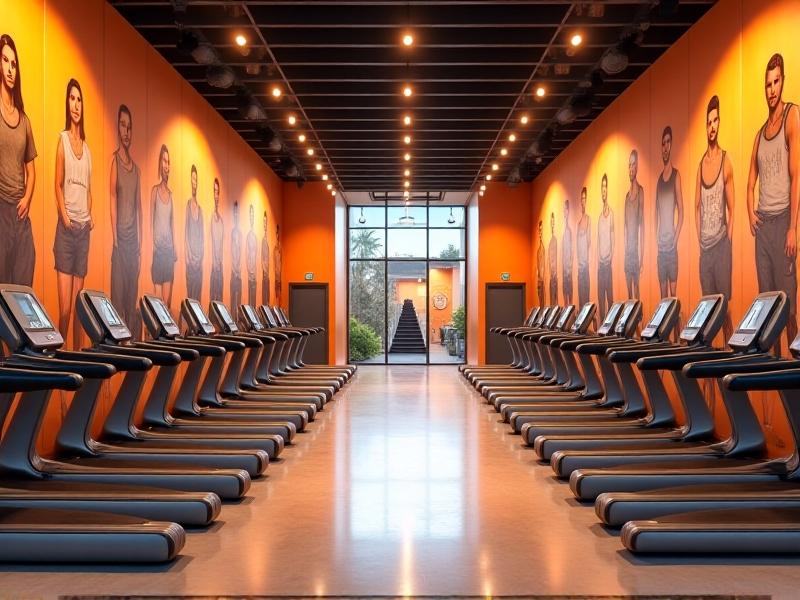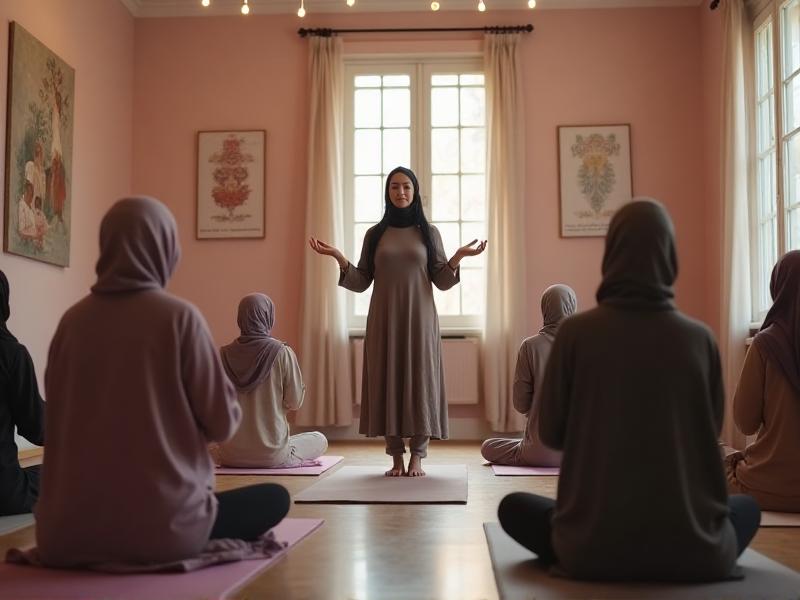Cultural Sensitivity in Multifaith Exercise Groups
Understanding Cultural Sensitivity in Multifaith Exercise Groups
Cultural sensitivity is the awareness and respect of cultural differences and similarities within a group. In multifaith exercise groups, this concept becomes crucial as participants come from diverse religious and cultural backgrounds. Understanding cultural sensitivity involves recognizing the unique needs, values, and practices of each individual. This awareness fosters an inclusive environment where everyone feels respected and valued.
Multifaith exercise groups often include members who practice different religions, each with its own set of beliefs, dietary restrictions, and dress codes. For instance, some religions may have specific days of worship or periods of fasting, which could affect participation in group activities. Being culturally sensitive means acknowledging these differences and making accommodations where necessary.
Moreover, cultural sensitivity extends beyond religious practices to include cultural norms and traditions. For example, certain cultures may have specific etiquette around physical touch or eye contact, which could influence how members interact during exercise sessions. By understanding and respecting these cultural nuances, group leaders can create a more harmonious and inclusive environment.

The Importance of Inclusivity in Multifaith Exercise Groups
Inclusivity is the cornerstone of any successful multifaith exercise group. It ensures that all members, regardless of their religious or cultural background, feel welcome and valued. Inclusivity goes beyond mere tolerance; it involves actively creating an environment where diversity is celebrated and differences are embraced.
One of the key aspects of inclusivity is the language used within the group. It's important to use inclusive language that respects all faiths and cultures. For example, instead of using religious-specific terms like "Christmas" or "Ramadan," group leaders can use more neutral terms like "holiday season" or "festive period." This small change can make a big difference in making everyone feel included.
Another important aspect of inclusivity is the physical environment. The exercise space should be welcoming and accommodating to all members. This might include providing prayer rooms, ensuring that the space is accessible to people with disabilities, and offering gender-neutral changing facilities. By taking these steps, group leaders can create a space where everyone feels comfortable and respected.

Navigating Religious Practices and Exercise Routines
Religious practices can significantly impact participation in exercise routines. For example, some religions have specific days of worship or periods of fasting, which may affect when and how members can participate in group activities. Understanding these practices is essential for creating a schedule that accommodates everyone.
For instance, during Ramadan, Muslims fast from dawn to sunset, which may affect their energy levels and ability to participate in strenuous activities. Group leaders can accommodate this by scheduling lighter exercises or offering alternative activities during this period. Similarly, Jewish members may observe the Sabbath, which runs from Friday evening to Saturday evening, and may prefer not to participate in group activities during this time.
It's also important to be aware of religious dress codes. Some religions require modest clothing, which may affect the type of exercises that can be comfortably performed. For example, Muslim women may wear hijabs, which could make certain activities like swimming more challenging. Group leaders can address this by offering alternative activities or providing appropriate facilities.

Building Trust and Respect in Multifaith Groups
Trust and respect are fundamental to the success of any multifaith exercise group. These values help to create a safe and supportive environment where members feel comfortable expressing their needs and concerns. Building trust and respect involves open communication, active listening, and a commitment to understanding and honoring each member's beliefs and practices.
One way to build trust is by encouraging open dialogue. Group leaders can create opportunities for members to share their experiences, beliefs, and concerns. This could be through regular meetings, feedback sessions, or informal conversations. By fostering open communication, leaders can gain valuable insights into the needs of the group and address any issues that arise.
Respect is also demonstrated through actions. This might include making accommodations for religious practices, using inclusive language, and ensuring that all members feel valued and included. By consistently demonstrating respect, group leaders can build a strong sense of community and belonging among members.
Addressing Potential Conflicts and Misunderstandings
In any diverse group, conflicts and misunderstandings are inevitable. However, in multifaith exercise groups, these issues can be particularly sensitive due to the deeply held beliefs and practices of the members. Addressing potential conflicts requires a proactive approach, including clear communication, empathy, and a willingness to find common ground.
One common source of conflict is differing religious practices. For example, some members may feel uncomfortable with certain exercises or activities that conflict with their beliefs. In such cases, it's important to have open discussions and find compromises that respect everyone's needs. This might involve offering alternative activities or adjusting the schedule to accommodate different practices.
Misunderstandings can also arise from cultural differences. For instance, certain gestures or behaviors may have different meanings in different cultures, leading to unintentional offense. Group leaders can address this by educating members about cultural norms and encouraging a culture of curiosity and learning. By fostering an environment where members feel comfortable asking questions and clarifying misunderstandings, leaders can prevent conflicts from escalating.
Creating a Welcoming and Inclusive Environment
Creating a welcoming and inclusive environment is essential for the success of any multifaith exercise group. This involves more than just accommodating religious practices; it requires a holistic approach that considers the physical, emotional, and social needs of all members.
One key aspect of creating an inclusive environment is the physical space. The exercise area should be accessible to people of all abilities and should include facilities that accommodate different religious practices. For example, providing prayer rooms, gender-neutral changing facilities, and accessible equipment can make a big difference in ensuring that everyone feels welcome.
Another important factor is the group's culture. Group leaders should foster a culture of respect, inclusivity, and support. This might involve setting clear expectations for behavior, encouraging open communication, and celebrating diversity. By creating a positive and inclusive culture, leaders can ensure that all members feel valued and respected.
Educating Members on Cultural Sensitivity
Education is a powerful tool for promoting cultural sensitivity in multifaith exercise groups. By educating members about different cultures and religions, group leaders can foster a deeper understanding and appreciation of diversity. This, in turn, helps to create a more inclusive and respectful environment.
One effective way to educate members is through workshops and training sessions. These sessions can cover topics such as cultural norms, religious practices, and effective communication strategies. By providing members with the knowledge and skills they need to navigate cultural differences, leaders can help to prevent misunderstandings and conflicts.
Another approach is to incorporate cultural education into the group's activities. For example, group leaders can organize cultural exchange events where members share their traditions, foods, and stories. These events not only educate members but also celebrate the diversity within the group, fostering a sense of community and belonging.
Celebrating Diversity in Multifaith Exercise Groups
Celebrating diversity is an essential part of creating a vibrant and inclusive multifaith exercise group. By recognizing and honoring the unique contributions of each member, group leaders can foster a sense of pride and belonging among participants.
One way to celebrate diversity is through special events and activities. For example, group leaders can organize cultural festivals, where members share their traditions, foods, and music. These events not only celebrate diversity but also provide opportunities for members to learn from each other and build stronger connections.
Another approach is to incorporate diverse elements into the group's regular activities. For instance, group leaders can include exercises or music from different cultures in their routines. By doing so, they not only celebrate diversity but also create a more dynamic and engaging experience for members.
Encouraging Open Dialogue and Feedback
Open dialogue and feedback are crucial for the continuous improvement of multifaith exercise groups. By encouraging members to share their thoughts and experiences, group leaders can gain valuable insights into the needs and concerns of the group. This, in turn, helps to create a more responsive and inclusive environment.
One effective way to encourage open dialogue is through regular feedback sessions. These sessions can be held after each exercise session or on a monthly basis, and should provide a safe space for members to express their thoughts and suggestions. By actively listening to feedback, leaders can identify areas for improvement and make necessary adjustments.
Another approach is to create opportunities for informal conversations. For example, group leaders can organize social events or coffee meetups where members can connect and share their experiences in a relaxed setting. By fostering open communication, leaders can build a stronger sense of community and trust among members.
Adapting to the Changing Needs of the Group
Multifaith exercise groups are dynamic and ever-evolving, with members' needs and circumstances changing over time. To remain effective and inclusive, group leaders must be adaptable and responsive to these changes. This requires a proactive approach, including regular assessments and a willingness to make adjustments as needed.
One way to stay attuned to the group's changing needs is through regular check-ins with members. These check-ins can be formal or informal and should provide an opportunity for members to share any new concerns or needs. By staying connected with members, leaders can quickly identify and address any emerging issues.
Another important aspect of adaptability is flexibility in the group's activities and schedule. For example, if a significant number of members are observing a religious holiday, leaders can adjust the schedule to accommodate this. Similarly, if new members join with different needs or preferences, leaders can modify the activities to ensure everyone feels included.
Fostering a Sense of Community and Belonging
Fostering a sense of community and belonging is essential for the long-term success of multifaith exercise groups. When members feel connected and supported, they are more likely to remain engaged and committed to the group. This sense of community can be cultivated through shared experiences, mutual support, and a commitment to inclusivity.
One way to foster a sense of community is through team-building activities. These activities can help members get to know each other, build trust, and develop a sense of camaraderie. For example, group leaders can organize team challenges, social events, or volunteer opportunities that bring members together in meaningful ways.
Another important factor is the role of the group leader in creating a supportive environment. Leaders should model inclusive behavior, encourage mutual respect, and provide opportunities for members to connect and support each other. By fostering a positive and inclusive culture, leaders can help to create a strong sense of community and belonging among members.







